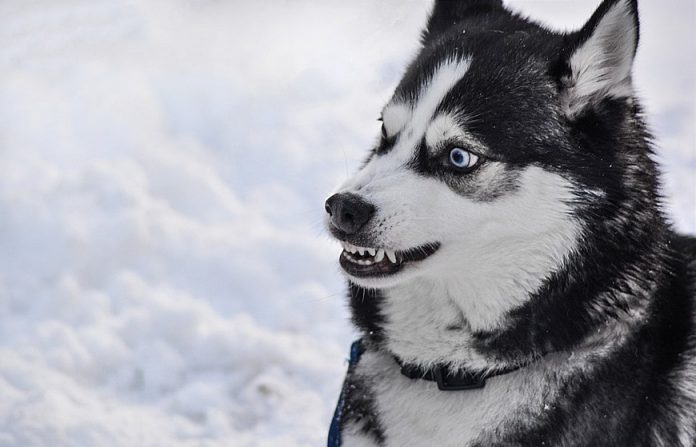Teeth’s chattering is characterized by teeth clacking together. If your pet didn’t use to do it but has now started, you might be thinking if there’s something wrong with your dog.
There are several reasons why dogs chatter their teeth. More often than not, it has something to do with their response to the environment. It’s either a positive or negative reaction to something.
Sometimes, it’s because of advanced periodontal disease. What is this condition? Learn more about it and identify the real cause your dog’s chattering in this blog.
Reason #1: The dog is suffering from oral pain.
Oral pain is the most common reason why dogs chatter their teeth. It’s possible for them to chatter even after they were given an anesthesia. But how can you identify oral pain in dogs?
Dr. Donald DeForge, VMD, believes that oral radiology must find its way into hospitals. This way, vets can have an accurate diagnosis. Dr. DeForge noted in the Veterinary Practice News that aside from chattering, the other symptoms of oral pain in dogs are as follows:
- Excessive production of saliva
- Aggressiveness
- Swallowing the food whole
- Preference to soft rather than hard food
- Lip-smacking
- Changes in sleep pattern
- Less desire in eating
- Withdrawal
- Less interest in playing
- Blood in food and water bowl
- Blood coming from the nose
The thing is, some vets do not believe that oral pain or dog cavity exists. This is because dogs tend to hide signs of illness or weakness. This instinct is pretty common in animals in the wild but domesticated animals can possess it too. They believe that showing pain makes them vulnerable to attacks.
If you suspect that your pet is suffering from oral pain, don’t hesitate to bring him to an animal dentist. There are several kinds of dental treatments for dogs. Depending on the diagnosis, some dogs may only need a simple dental medication while some have to undergo oral surgery procedures.
Make it a habit to check your dog’s mouth. Is his gum swollen or bleeding? See if his teeth are not cracking because this is sometimes due to the lack of enamel. Dogs tend to chatter their teeth when they are in pain.
Reason #2: He smelled something unusually interesting
Does your pooch chatter his teeth while sniffing something? Your dog is likely concentrating because he can’t discern a substance. Canines have a powerful sense of smell, thanks to the 300 million olfactory receptors in their noses.
Your buddy might be examining the smell with the help of his incisive papilla, which is the bump on the roof of his mouth. It works hand in hand with your pet’s vomeronasal organ which is in charge of detecting pheromones.
Pheromones are naturally occurring odorous substances dogs release to communicate or cause a physiological reaction. When your pet sniffs and chatters his teeth when smelling urine, your dog might smell the pheromones from another dog’s excrement.
Dogs emit pheromones in a multitude of ways and one of them is through their urine. Female dogs release those pheromones that are meant to be picked up by male dogs. Amazingly, male dogs can pick them up even from miles away.
Reason #3: He is shivering.
As with humans, dogs could chatter their teeth while shivering. It might be from the cold, when they are frightened by something, when they have fractures, or when they have a fever.
More often than not, shivering happens when dogs are feeling cold. It is their body’s response when the temperature starts dropping. The skeletal muscles create warmth by expanding energy through shivering or shuddering.
Short-haired dogs, especially the newborns and puppies, are less equipped to handle the cold weather than long-haired dogs. Examples of short-haired dogs which are most prone to falling temperatures are the Yorkshire, French bulldog, and Chihuahua.
Regardless of their breed and the length of their hair, any dog can get cold when the weather is harsh enough. Even long-haired ones with thick furs and extra layers of body fat can get cold. Do note that dogs with existing health conditions can be more sensitive to cold as well.
You’ll know your dog is cold if you touch his ears and they feel cold. Also keep an eye for slow breathing and movements. Hairless dogs can also suffer from skin dryness due to the cold weather.
Protect your dog from the cold by giving him a warm sleeping place. When your pet normally sleeps outside, move his bed inside the home. They could suffer from hypothermia if left in the cold for too long.
If you live in a place known for its cold temperature, it’s best to provide your pet with his own blanket. There also coats and sweaters specially made for doggies.
Reason #4: He is just purely excited.
There are instances when dogs chatter their teeth out of joy. Canines experience a range of emotions and that includes excitement.
Matthew Hoffman wrote in his book “Dogspeak: How to Understand Your Dog and Help Him Understand You” that dog teeth chattering is often because of happy anticipation. There are so many things that get dogs excited about but the most common is seeing their owners come home.
Reason #5: He might be suffering from focal motor seizures.
Dogs experience partial seizures and one of this is the focal motor seizure. Partial seizures are often associated with short bouts of teeth chattering. There are several causes of partial seizures in canines. It could be any of the following:
- Distemper
- Tumor in the brain
- Deficiency in calcium
- Poisoning
- Problems in the liver/kidney
- Head trauma
The common treatments for focal motor seizures are phenobarbital and potassium bromide. Phenobarbital is a type of medication recommended by the World Health Organization for treating epilepsy. Potassium bromide is an anticonvulsant also used for dogs with idiopathic epilepsy. Dogs that don’t respond well to these kinds of medications already need newer anticonvulsants.
Reason #6: He is afraid, anxious, or stressed.
Sometimes, dogs chatter their teeth as a reaction to something they are anxious about or afraid of. Dogs may display changes in body posture when they are stressed. Teeth chattering could be just one of those unlikely changes.
All breeds can be susceptible to anxiety, but there are certain types of dogs that are known to be more prone to developing it. Dr. Adam Denish, owner and veterinarian at the Rhawnhurst Animal Hospital said anxiety is often seen in smaller breeds. Shih-Tzu, Chihuahua, and Jack Russell are just some of the small breeds believed to be more predisposed to anxiety than other breeds.
Thing is, it is quite complicated to figure out what’s really causing our dog’s stress because our pets cannot speak their minds. The best thing we can do is to be observant enough in order to spot the signs.
Is he chattering his teeth during thunderstorms? Does he do it when he sees that you’re about to go out of the house? It could be separation anxiety. We have to know what’s causing their stress so we can eventually help our furry friends. The symptoms of stress and anxiety in canines are often the following:
- Inappetence
- More desire or need to sleep
- Isolation
- Digestive problems
- Aggression
Just like people, it is normal for dogs to like some alone time every now and then. But if your pet always sets himself apart from people and even from other pets, it could be a warning sign that he is suffering from anxiety.
There are a few things you can do to relieve your dog’s stress. One of this is to let him do things that provide a sense of normalcy. This could be simple routine commands he usually does. Experts discourage overly comforting them because it will only justify their fears.
It will help a lot if dogs have a place they can turn to during stressful situations such as parties and thunderstorms. You can create a relaxing crate for your dog.
If the dog is constantly stressed and has started showing self-destructive behavior like excessive licking to the point that he already gets open sores, it’s best to seek your vet’s help regarding this matter. The diagnosis involves a series of tests before deciding on the type of behavioral medication appropriate for a dog.
Reason #7: It could be a sign of White Dog Shaker Syndrome
Teeth chattering is one of the symptoms of white dog shaker syndrome, a condition that causes full body tremors in small dog breeds.
Conclusion
Dogs chatter their teeth for a number of reasons. It can be out of emotion or an underlying medical condition. The best way to figure it out is to observe your dog a little more. If your dog’s teeth chattering will not stop and comes with any other symptoms, it’s best to consult a veterinarian about it.























